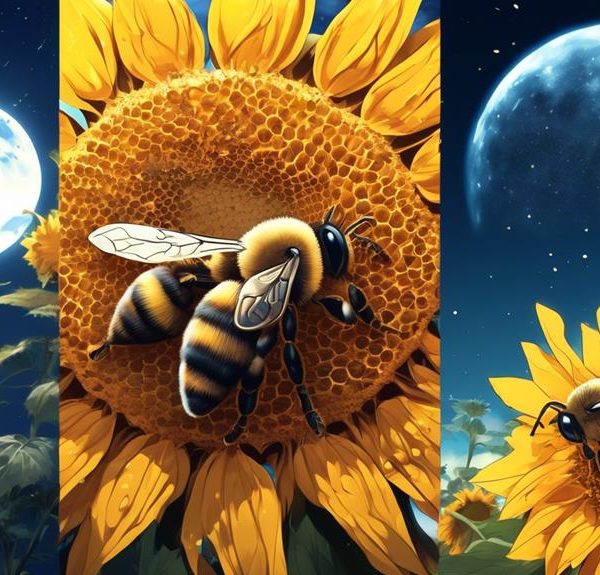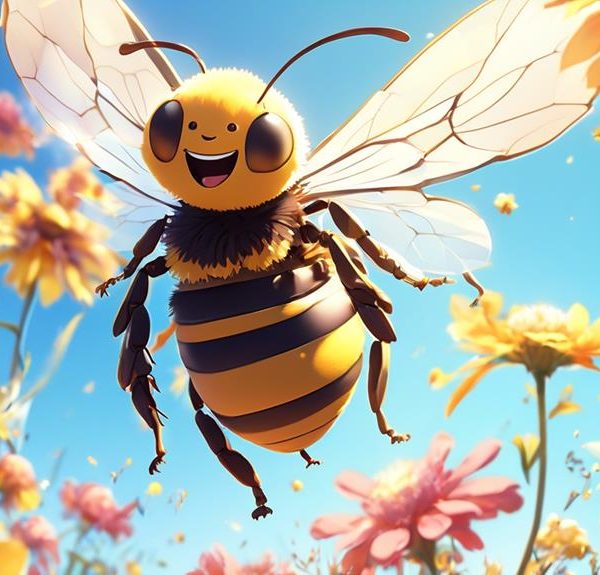Keeping up with the buzz, explore the intricate biology of bees and find out if these hardworking insects ever tire out.
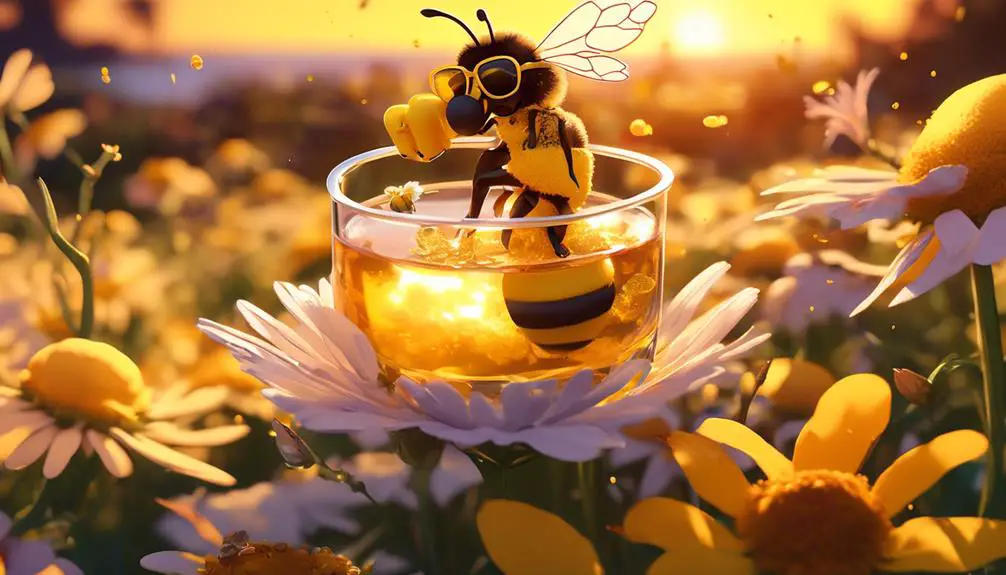
Do Bees Get Tired?
Imagine, if you will, a world where you're tirelessly buzzing from dawn to dusk, with no concept of a weekend or a vacation. This is the life of a bee, an insect renowned for its unyielding work ethic.
As you observe their relentless flight from flower to flower, you might wonder, 'Do bees ever get tired?' It's an intriguing question, and the answer is not as straightforward as you might think. The truth lies in the intricate biology of these fascinating creatures.
But, to fully appreciate and understand it, you need to delve deeper into the world of bees – their lifestyle, energy mechanics, and sleep patterns. Buckle up, as we are about to embark on an enthralling journey into the life of bees.
Key Takeaways
- Bees have a unique metabolic system that allows for high energy output for extended periods.
- Bees exhibit signs of fatigue when they have exhausted their energy reserves.
- Bees have designated sleeping areas within the hive and exhibit distinct sleep patterns throughout the day.
- Sleep is vital for bees' survival as it allows them to consolidate memories and recover their energy.
Understanding Bee Biology
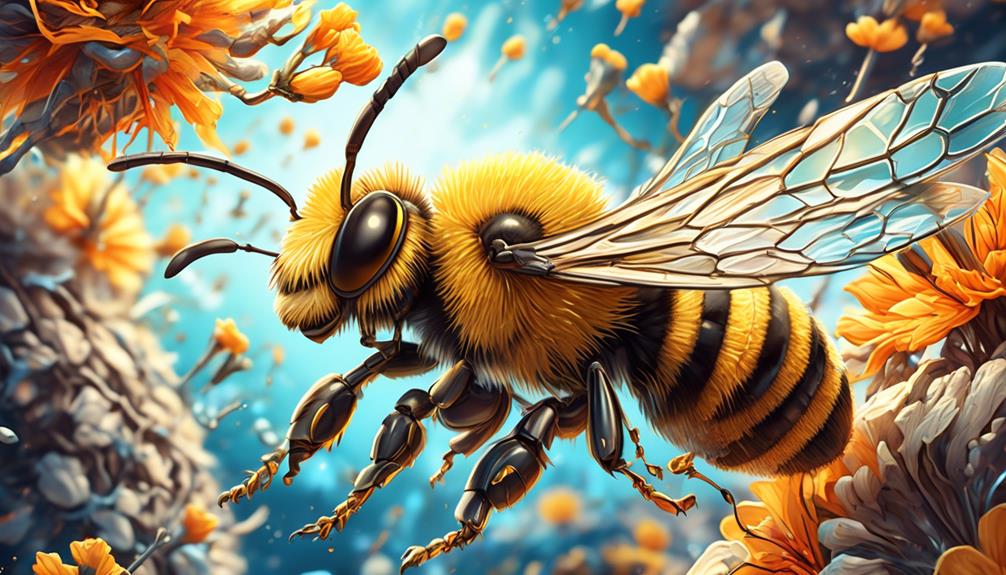
To fully grasp whether bees get tired, you need to delve into the intricate biology of these fascinating insects. Bees are part of the insect order Hymenoptera, which includes ants and wasps. They're social creatures that live in colonies, each member fulfilling a specific role. Worker bees, the ones you're likely most familiar with, are females who don't reproduce. Their life is a flurry of activity, with tasks ranging from collecting nectar and pollen, to building and repairing the hive, to feeding and grooming the larvae.
You'd think that with all this work, bees would certainly get tired. But here's where their biology comes into play. Bees have a unique metabolic system, capable of high energy output for extended periods. They're powered by nectar, a sugar-rich liquid that provides the necessary carbohydrates for their energy-intensive tasks.
Additionally, bees possess an efficient respiratory system that ensures a steady supply of oxygen to their flight muscles, allowing for sustained activity. Therefore, while it might seem like bees should get tired, their biology is uniquely adapted to prevent this. They're tireless workers, built to endure.
Bees and Their Daily Routines
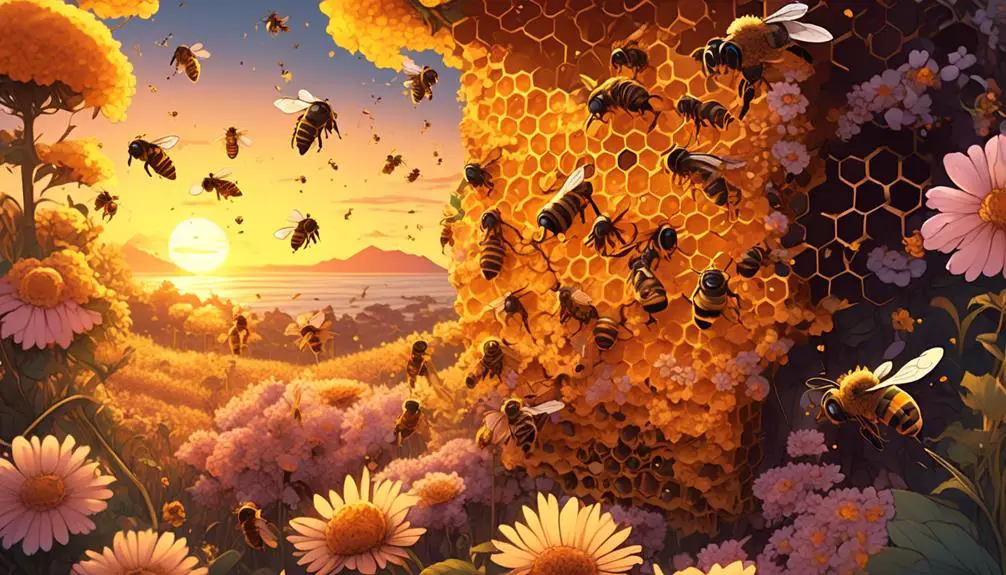
Diving into the daily routines of bees, you'll find their lives are characterized by a rhythmic, regimented pattern of activities, each timed to perfection for the smooth functioning of the colony. From dawn, worker bees embark on their tireless quest for nectar and pollen.
For the sake of understanding, let's break down their schedule into three primary activities:
Activity | Description |
|---|---|
Foraging | Bees start their day foraging for nectar and pollen, often covering vast distances. They're not just food gatherers; they're also nature's top pollinators. |
Honey Production | Once back at the hive, bees transform the gathered nectar into honey. This process involves complex enzymatic reactions and is vital for the colony's survival, especially during winter. |
Hive Maintenance | Bees also perform essential tasks such as cleaning the hive, feeding the larvae, and guarding against intruders. |
In daylight, bees are relentless, their activities dictated by the sun. As dusk falls, they retreat to their hive, but this doesn't signify rest. Hive maintenance tasks continue, demonstrating their industrious nature. Hence, in a bee's life, fatigue is a foreign concept. They're a testament to resilience, the epitome of tireless dedication.
Sleep Patterns in Bees
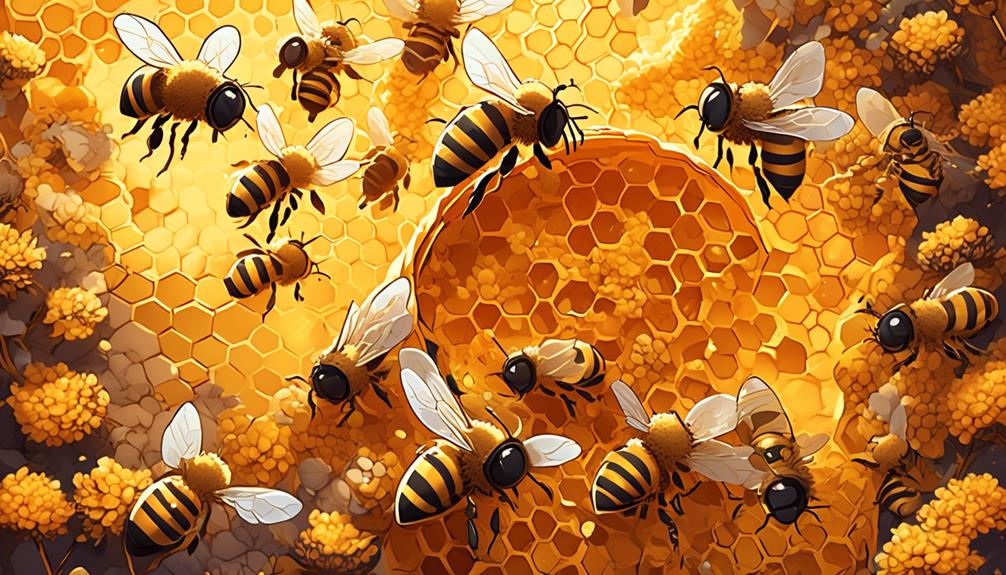
Despite their tireless work ethic, bees do actually have a sleep cycle, exhibiting patterns that remarkably parallel those found in larger, more complex organisms. Just like you, bees need to rest. They don't have eyelids to close, but they do show signs of sleep by ceasing their movements and adopting a relaxed posture. Their antennae, usually active, also droop, signifying their dormant state.
Studies have shown that bees have a circadian rhythm, a biological process observed in humans and other animals, which cycles roughly every 24 hours. In bees, this cycle controls not only sleep but also activities like foraging and defense. Sleep isn't just a luxury for these small creatures; it's vital for their survival. It's during sleep that bees consolidate their memories, a process crucial for effective foraging.
You might wonder how bee colonies, buzzing with activity, maintain these sleep cycles. Well, it's been discovered that bees have designated 'sleeping areas' within the hive. Older bees, who perform tasks requiring more cognitive effort, tend to sleep more.
The Energy Mechanics of Bees
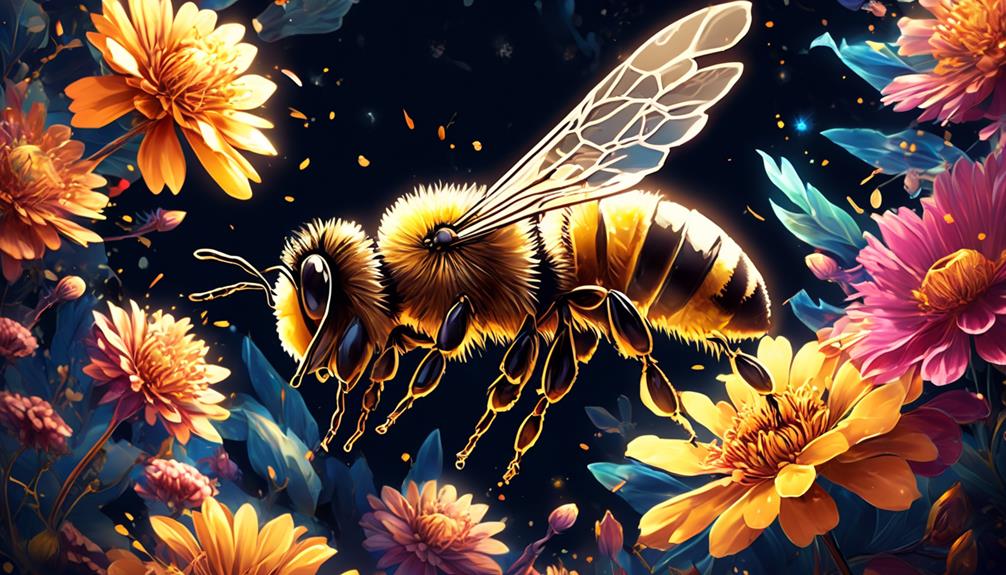
Understanding the energy mechanics of bees can offer insights into their remarkable endurance and efficiency. They're tiny, yet extraordinarily powerful and tireless. You might wonder, how do they achieve this?
Energy Source | Impact on Bees | Emotional Connection |
|---|---|---|
Nectar | Nectar, rich in sugars, fuels their fast-paced flight muscles. | You may feel awe at their ability to convert simple sugars into raw power. |
Pollen | Protein-rich pollen builds their bodies, giving them the strength to work tirelessly. | You'll likely admire their efficient use of resources. |
Rest | Even bees need downtime to recharge, despite their tireless reputation. | You'll find a sense of kinship; they're not so different from us. |
As you can see, bees work smart, not hard. They access readily available resources to fuel their body and flight muscles, while also recognizing the need for rest. Their amazing energy conversion efficiency allows them to keep buzzing around, pollinating flowers, and making honey. You'll realize, it's not about whether they get tired, but how they manage their energy. This understanding might make you appreciate bees more, recognizing them as the tireless, efficient, and crucial workers of our ecosystems.
Expert Insights: Do Bees Tire?
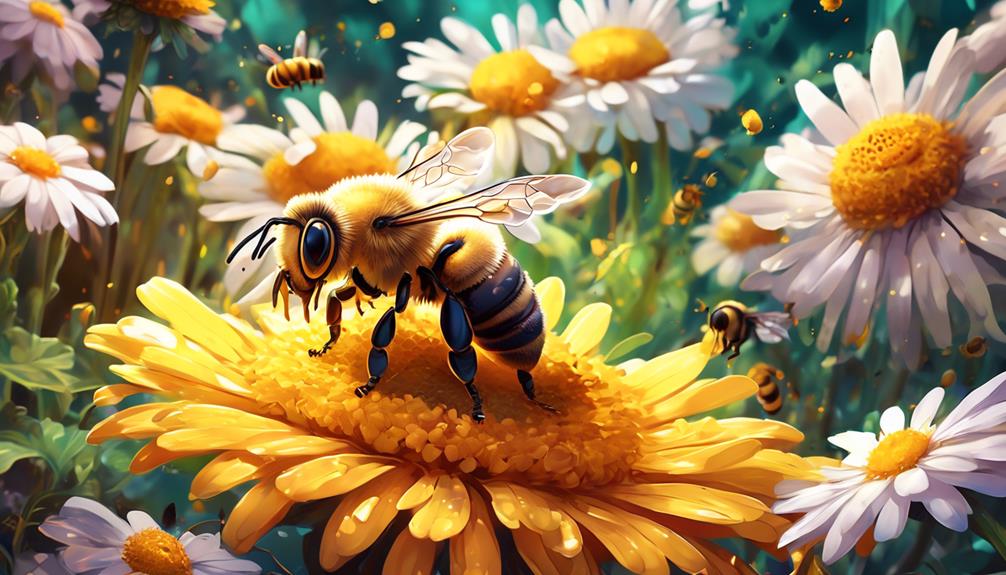
In light of these observations, you might still be wondering, 'Do bees ever tire?' Let's delve into insights from experts in the field of entomology and apiculture.
According to research by entomologist Dr. May Berenbaum, bees do exhibit signs of fatigue. When bees have exhausted their energy reserves, they might be seen resting on flowers, or even falling to the ground. However, they're not 'tired' in the human sense. Bees don't have lungs or a circulatory system like ours. Instead, they possess a tracheal system that delivers oxygen directly to their cells, allowing them to recover quickly.
Moreover, bees' distinct sleep patterns are further evidence of their need for rest. Unlike us, bees don't sleep through the night. They've periods of rest throughout the day, typically during the darkest hours. This pattern supports their high-energy lifestyle, allowing them to recharge without wasting daylight hours.
Frequently Asked Questions
How Do Bees Communicate With Each Other in the Hive?
Bees communicate with each other using a method called the 'waggle dance'. When a bee finds a good source of food, it'll head back to the hive and perform this dance. The dance's direction, duration, and speed tell the other bees the location and distance of the food source.
What Is the Average Lifespan of a Bee?
You're curious about the average lifespan of a bee, aren't you? Well, it varies by species.
Worker honeybees typically live about 6 weeks during the summer, while the queen can live up to 5 years.
Bumblebees and solitary bees, on the other hand, usually live just a few months.
It's important to note, however, that these lifespans can be influenced by factors like diet, weather, and exposure to diseases or pesticides.
What Impact Does Climate Change Have on Bees?
Climate change significantly impacts bees. As you know, bees are highly temperature sensitive. Warming temperatures alter their habitats, leading to mismatches between bees and the flowering plants they rely on.
Extreme weather events can also destroy bee colonies. In fact, climate change's disruption to bees' lifecycle could cause declines in bee populations, threatening their role in pollination.
It's crucial to address climate change to ensure bees, and the ecosystems they support, thrive.
How Do Bees Contribute to the Ecosystem?
You're aware that bees play a vital role in our ecosystem. They're primary pollinators, transferring pollen and seeds from one flower to another, fertilizing the plant so it can grow and produce food. This cross-pollination helps at least 30% of the world's crops and 90% of our wild plants to thrive. Without bees, our food variety would drastically shrink.
They're also key biodiversity indicators, and their decline signals wider ecosystem threats.
What Are Some Common Threats to Bees and Their Survival?
You've asked about threats to bees' survival. Well, they're facing quite a few.
Pesticides are a major danger, along with habitat loss due to urbanization. Climate change's impact can't be ignored either; it disrupts their food supply. Additionally, diseases and parasites, like the Varroa mite, also play a role in bee population decline.
Bees are essential for pollination, so these threats aren't just their problem—they're ours too.
Conclusion
You've journeyed through the fascinating world of bee biology, exploring their daily routines, sleep patterns, and energy mechanics.
You've delved into expert insights, and now it's clear – yes, bees do get tired.
They work hard, sleep, and even exhibit signs of fatigue.
This underscores their amazing resilience and the critical role they play in ecosystems.
So next time you spot a bee, remember, they're not just buzzing around—they're working tirelessly for the survival of their colony.

